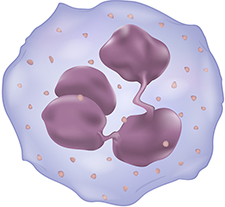Office of Research & Development |
 |


VA researchers studied the effects of standard- versus high-dose flu vaccine on the risk of hospitalization among nursing home residents. (Photo for illustrative purposes only. ©iStock/Bojan89)
August 17, 2017
By Tristan Horrom
VA Research Communications
"Influenza vaccine provides important protection for older adults, and this protection is additive with the high-dose vaccine for outcomes people should care about, like hospitalization."
Giving elderly nursing home residents high-dose flu vaccines rather than standard doses could lead to fewer respiratory infections and other illnesses, according to a study led by Providence VA Medical Center researchers. They studied hospitalization rates among more than 50,000 nursing-home residents who had been given either a high-dose or standard-dose flu vaccine during one flu season. The high-dose group had fewer hospitalizations, both for respiratory infections and overall.
The results appeared online July 20, 2017, in The Lancet: Respiratory Medicine.
The researchers compared high-dose versus standard-dose vaccines in 823 Medicare-certified nursing homes. The study randomly assigned 409 of the facilities to administer high-dose vaccines to residents, and the other facilities to give standard doses, as part of the facilities' standard of care in the fall of 2013.
The researchers then looked at hospital admissions among all the residents, finding 38,256 Medicare hospital claims in all over the ensuing six months. The results showed 13 percent fewer hospitalizations for lower respiratory-tract infections in the high-dose group, compared with the standard-dose group. There were also 8 percent fewer hospitalizations for any cause in the high-dose group.
Since the flu can lead to hospitalization or deaths from non-respiratory causes—such as circulatory problems—the lower all-cause hospitalization rate adds to the evidence that the high-dose vaccine was more effective at preventing flu in these patients. Patients in the high-dose group also had fewer hospitalizations than the standard group specifically for pneumonia.
Dr. Stefan Gravenstein, lead author on the paper, says the work "counters what many vaccine skeptics say." He says the results show that "influenza vaccine provides important protection for older adults, and this protection is additive with the high-dose vaccine for outcomes people should care about, like hospitalization."

Lower respiratory tract infection—including pneumonia and bronchitis—is the leading cause of infectious-disease-related hospital trips for adults 65 and older. Pneumonia and influenza are also the leading cause of infectious death for this elderly population. Almost 80 percent of flu-related death in the United States are people 65 or older. Older adults who are frail, such as those who live in nursing homes, are especially susceptible to adverse outcomes from respiratory infections.
One of the biggest causes of clinically important respiratory infections is the flu. More than 4 million adults 65 and older are affected by the flu each year in the United States. Many more nursing home residents go to the hospital during peak flu season than at other times of the year.
The Centers for Disease Control and Prevention recommend that people in all age groups get flu shots to stave off the virus. However, flu vaccines have been shown to be less effective in older, frail adults because they usually have weakened immune systems, compared with younger, healthy adults. People with weaker immune systems produce a less protective response to vaccines.
The FDA in 2009 approved a high-dose flu vaccine, which has four times more antigen than the standard dose. The idea is that having more flu virus particles in the vaccine will improve the body's immune response, stimulating it to generate more and possibly better antibodies.
While other research has suggested that high-dose flu vaccines may be more effective at preventing flu in an older population, results have been mixed.
The new Providence VA study is the most rigorous to date to clinically evaluate high-dose flu vaccines specifically in nursing home residents. Since elderly people living in nursing homes tend to be frailer than younger patients or those living independently and often have other chronic illnesses, they are likely more vulnerable to the flu. While some studies question whether high-dose vaccines are more effective than low dose, it may be that older and sicker patients with weakened immune systems—such as those living in nursing homes—could especially benefit from the high-dose vaccines, suggest Gravenstein and his colleagues.
These benefits seem to come without much downside. According to Gravenstein, the occurrence of serious adverse events with the high-dose flu vaccine is similar to or better than the rate with the standard dose. While recipients who get the high-dose vaccine may notice more pain at the injection site in the first two days after vaccination, the high dose has not been shown to pose any greater risk.
Using high-dose flu vaccines could also lower medical costs for the sickest elderly patients. "Elderly who are vaccinated with high-dose vaccine while hospitalized during or just before the flu season will have a reduced subsequent hospitalization risk during the flu season and possibly a reduced 30-day readmission risk," says Gravenstein. While the high-dose vaccine could be more expensive for hospitals that order the vaccine but do not plan to charge insurance, Gravenstein points out that flu vaccines are covered by insurance in the U.S.
The study has several limitations that should be noted.
The researchers were unable to compare results to a control group who did not receive vaccines. Because of this, they could only compare the two vaccines doses, rather than looking at the absolute benefit of getting a vaccine versus not.
Further, they could not directly determine the overall effectiveness of either vaccine in preventing the flu, just biologically plausible differences in flu-related outcomes such as hospitalizations. They also were not able to check lab results to confirm that patients who went to the hospital for respiratory problems actually had the flu. Therefore, it is possible that some of the hospitalizations were not related to the flu, and thus not affected by vaccine strength. However, the large sample size and randomized design of the study largely overcome this shortcoming, say the researchers.
Another caveat: The study took place during a flu season (November 1, 2013 - May 31, 2014) with a weaker strain of flu going around than in some other years. The strain of flu prominent that winter generally has a smaller impact on the elderly than stronger forms of the virus that may be present in other seasons. This could affect how well the results can be applied to future flu seasons.
It should also be noted that this study was funded by Sanofi Pasteur, the company that produces the flu vaccines, although the authors note that the sponsor did not have any direct involvement in the research.
Notwithstanding the study's limitations, the researchers believe their results show that high-dose flu vaccines could offer an important advantage over standard-dose vaccines for elderly patients to consider when they get their annual vaccination.
VA Research Currents archives || Sign up for VA Research updates